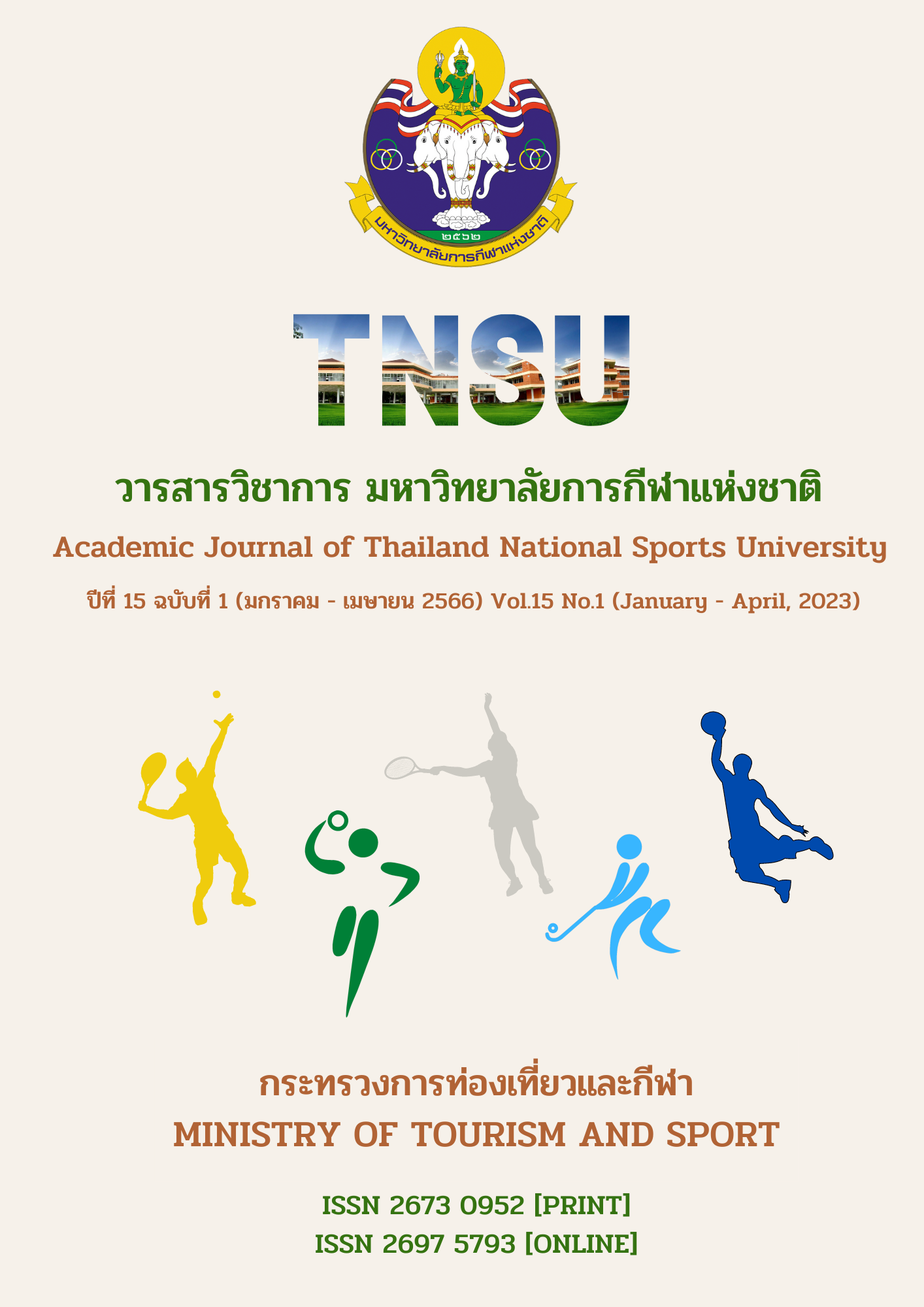EFFECTS OF HEALTH EDUCATION LEARNING MANAGEMENT USING SCAFFOLDING ON LEARNING ACHIEVEMENT AND HIGHER ORDER THINKING SKILLS OF SECONDARY SCHOOL STUDENTS
Main Article Content
Abstract
Purposes: To study the effects of health education learning management using scaffolding on learning achievement and higher order thinking skills of secondary school students. Methods: The subjects were 60 seventh grade students, divided equally into 30 for experimental group students who were assigned to study under the health education learning management using scaffolding while 30 students of the control group were assigned to study with the conventional teaching method. The research instruments were comprised of 8 health education lesson plans using scaffolding with IOC 0.98, as well as the data collection instruments including learning achievement in the area of knowledge, attitude, practice tests and higher order thinking skills test with IOC 0.97, 1.00, 0.89 and 0.88, and reliabilities with 0.81, 0.82, 0.81 and 0.80. The data were analyzed by mean, standard deviation and t - test. Results: The research findings are as follows: The mean scores of the learning achievement in the area of knowledge, attitude, practice and higher order thinking skills of the experimental group after learning were statistically significantly higher than that before learning at .05 level., and the mean scores of the learning achievement in the area of knowledge, attitude, practice and higher order thinking skills of the experimental group students after learning were statistically significantly higher than that the control group at .05 level. Conclusion: Health education learning management using scaffolding effects on learning achievement and higher order thinking skills of seventh grade students was higher than health education learning management with the conventional teaching method.
Article Details

This work is licensed under a Creative Commons Attribution-NonCommercial-NoDerivatives 4.0 International License.
The published article is a copyright of the Academic Journal of Thailand National Sports University. The passage appeared in each article in this academic journal is a perspective of each author which is not related to the journal. Each author is required to be responsible for all components of his/her own article. If there are any mistakes, each author must be responsible for those mistakes on his/her own.
References
Aimutcha Wattanaburanon. (2013). Principles of Health Education. Bangkok: Odeon Store.
Bloom, B. S., Engelhart, M. D., Furst, E. J., Hill W. H., & Krathwohl D. R. (1956). Taxonomy of educational objectives. Handbook I: Cognitive Domain. New York: David McKay.
Chatwan Lanchwathanakorn. (2011). Development of a scaffolded reading instructional system using mindtool with evidence - based intervention to enhance critical reading and critical thinking skills of sixth grade students with reading difficulties. Bangkok: Faculty of Education, Chulalongkorn University.
Eggen, P., & Kauchak, D. (1997). Educational Psychology: Windows on Classrooms (3rd ed.). New Jersey: Merrill, An Imprint of Prentice Hall.
Feng Xiaoying, Zhang Weiyuan, & Li Chen. (2008). Distance education in rural China achieves inter school collaboration and increased access to education. Asian Journal of Distance Education, 6(1), 27 – 38. Retrieved from http://www.AsianJDE.org/2008 v6.1.Feng.pdf
Government Gazette. (1999). National education act 1999. Retrieved from https://www.bic.moe.go.th/images/stories/Porrorbor2542.pdf
Jintana Sarayutpitak (2018). School Health Program (3rd ed.). Bangkok: Chulalongkorn University Press.
Larkin, M. J. (2001). Providing support for student independence through scaffolded instruction. Council for Exceptional Children, 34(1), 30 - 34.
Office of Education Council. (2017). National education plan 2017 - 2036. Bangkok: Century.
Office of the Basic Education Commission. (2008). The core curriculum of basic education 2008. Retrieved from http://academic.obec.go.th/images/document/1559878925 _d_1.pdf
Office of the National Economic and Social Development Board. (2017). National economic and social development plan, Vol. 12. Retrieved from https://www.nesdc.go.th/ewt_dl_link. php?nid=6422
Office of the Royal Society. (2014). Higher order thinking skills. Retrieved from http://legacy. orst.go.th
Rosenshine, B., & Guenther, J. (1992). Using scaffolds for teaching higher level cognitive strategies. In J. W. Keefe; and H. J. Walberg (Eds.), Teaching for Teaching, (pp.35 - 48). Virginia: National Association of Secondary School Principals.
Sitthipon Art - in. (2011). The development of learning achievement and analytical thinking for the pratomsuksa v students by using 5E inquiry cycle (Master’s thesis), Khon Kaen University.
Suchitra Kheawsri. (2009). A study of the development of a web - based teaching and learning model using skill enhancement to practice problem solving skills of junior students (Doctoral dissertation), Chulalongkorn University.
Supree Buranaikanit. (2013). Effects of different empowerment technologies in project - based learning on the ability to think, analyze and solve problems in robot programming of students at the educational level. junior high school (Doctoral dissertation), Chulalongkorn University.
Tan Praising, & Jintana Sarayuthpitak, (2017). The effect of learning management in health education by using the model Crystallized teaching on academic achievement and problem solving abilities of high school students. Journal of Education, 45(4), October - December. 56 - 71.
The central data warehouse system in education. (2020). Report data: Percentage of students to school - age population by school year 2020. Retrieved from http://www.eduwh.moe.go.th/pub/report/stat/?cmd.=eport&year=2020&rep=2&zone=& prov=&div=0&area=
Thitiporn Sangkharat, (2015). Cross - linking by imitation of cross-linking. Arguments from the model beyond the English indentation of Graduate level (Doctoral dissertation), Silpakorn University.
Tissana Kaemanee et al. (2001). Thinking science. Bangkok: The Master Group Management.
Tissana Kaemanee. (2017). Science of teaching: Knowledge for effective learning process (21st ed.). Bangkok: Chulalongkorn University Press.
Weist, M. D., Paternite, C. E., Wheatley - Rowe, D., & Gall, G. (2009). From thought to action in school mental health promotion. International Journal of Mental Health Promotion, 11(3), 32-41.
Witthayakorn Chiangkul. (2019). Education in Thailand 2018/2019. Bangkok: Office of the Education Council Secretariat, Bureau of Educational Management Evaluation.
Wood, D., Bruner, J., & Ross, G. (1976). The role of tutoring in problem solving. Journal of Child Psychology and Psychiatry 17(2), 89 – 100.


